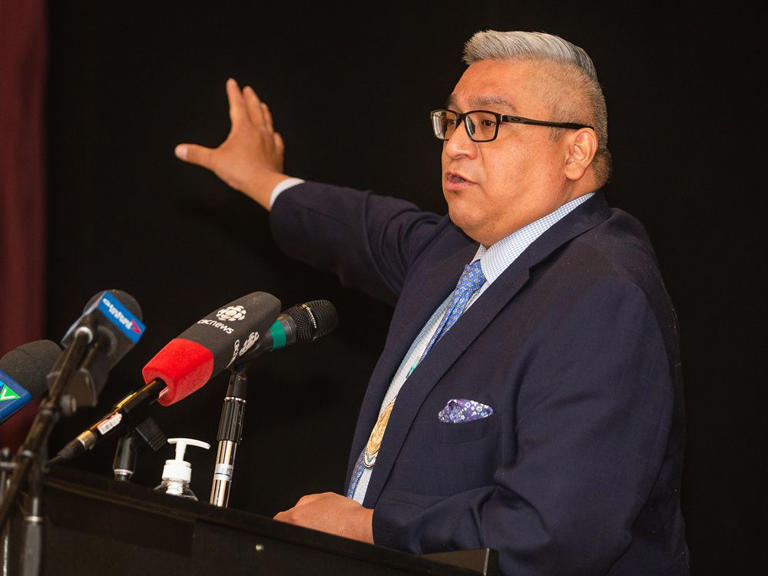Murray Mandryk: First Nations not sharing economic success, says chief
Opinion by Murray Mandryk •

FSIN vice-chief David Pratt said the rhetoric we hear from Premier Scott Moe and his government on economic successes doesn't include First Nations.© Provided by Leader Post
What bothered David Pratt is what he didn’t hear from Premier Scott Moe at his annual premier’s dinner/Saskatchewan Party fundraiser in Saskatoon last week.
The first vice-chief for the Federation of Sovereign Indigenous Nations heading FSIN’s social policy issues sat at the table of TransCanada Energy, where he heard Moe talk about a booming economy with low unemployment and unlimited potential in oil, potash, and especially the new critical minerals opportunities.
What the premier didn’t mention is how badly First Nations people are doing during this time of bounty.
By way of coincidence, the first vice-chief was engaged with Statistics Canada, trying to get additional information on First Nations poverty.
Pratt was eventually provided a chart showing there are some 29,870 “employable” adult First Nations people on Saskatchewan reserves with some 12,800 dependents requiring income assistance.
This would not necessarily capture all the urban First Nations people living off reserve, suggesting vast numbers of people not benefiting from all this prosperity.
“He (Moe) painted such a rosy picture of the economy,” Pratt said in an interview. “But you can’t ignore one-fifth of the population and expect them to continue to live in squalor and poverty.
“It’s like the sleeping giant, the 10,000-pound elephant and bear all in the room.”
While Saskatchewan has temporary foreign workers coming in from all over the world, the province sits on untapped human resources in our own backyard that are largely being excluded from that workforce, Pratt said.
Those temporary foreign workers may or or may not stay in Saskatchewan if better opportunities open up elsewhere, but First Nations people are mostly here to stay, he noted. That will mean that Saskatchewan will continue to struggle with their issues of addictions, housing, health care and poverty.
Such thoughts were foremost in Pratt’s mind last week as he listened to the premier offer his glowing assessment to a room of well-heeled political donors — the very people who likely have the wherewithal to help address these issues.
“I was standing on the bow of the ship and it felt like there’s an iceberg ahead,” Pratt said.
In fairness, Pratt said he believes there are ministers in Moe’s cabinet — many of them from rural Saskatchewan with reserves in their ridings — who do comprehended the extent of this problem.
The vice-chief also noted there are success stories to draw from, like the Meadow Lake Tribal Council’s forestry business that paid healthy dividends during the recent lumber shortage, jobs with pipelines and in the potash and other mining sectors where emphasis is being placed on First Nations hirings.
Asked what practices work best, Pratt cited the success of the Fort MacKay, Alta. band during the oilsands boom in which a mentorship program instilled needed job skill training and expectations on workplaces that stuck with those who participated.
“Some of the kids (that went through the oilsands mentorship program) are still there,” he said. “Some of them may be retired by now.”
Programs that work have a lot to do with solid First Nations leadership, but Pratt said chiefs and band councillors are overwhelmed with the problems before them.
“The reality is that First Nations leaders are managing poverty,” the vice-chief said, noting issues of health outcomes, food, water, drug and alcohol addiction, crime and gang violence and other issues now swamping reserve communities.
“I think the problem is that they are so overwhelmed.”
Clearly, the premier and his provincial government must work in unison with First Nations and the federal government to address issues. Co-operation has often been near non-existent and needs to be vastly improved.
Pratt noted that after Moe went to Washington to talk about critical minerals , the FSIN made the same trip to Washington a week later to discuss the same issue. Such a lack of co-ordination is unhelpful.
Worse, it’s an acknowledgement the government doesn’t recognize the First Nations problem or see how First Nations could be part of the solution.
Mandryk is the political columnist for the Regina Leader-Post and the Saskatoon StarPhoenix.
No comments:
Post a Comment